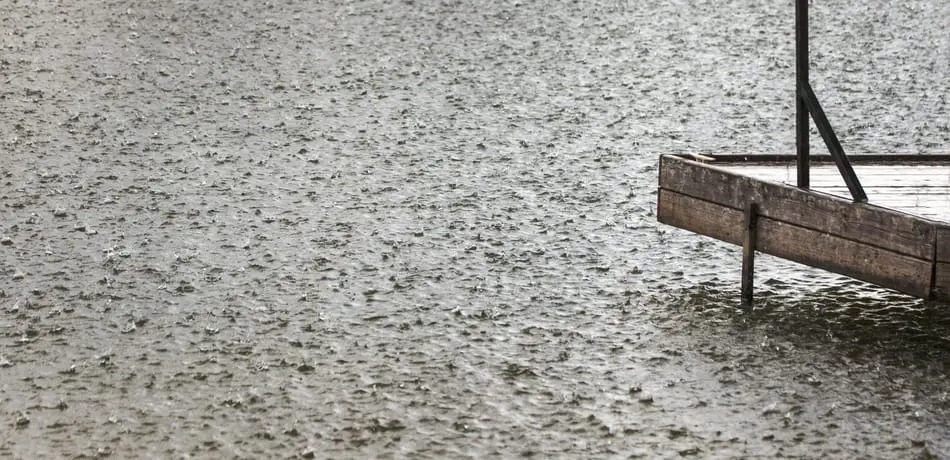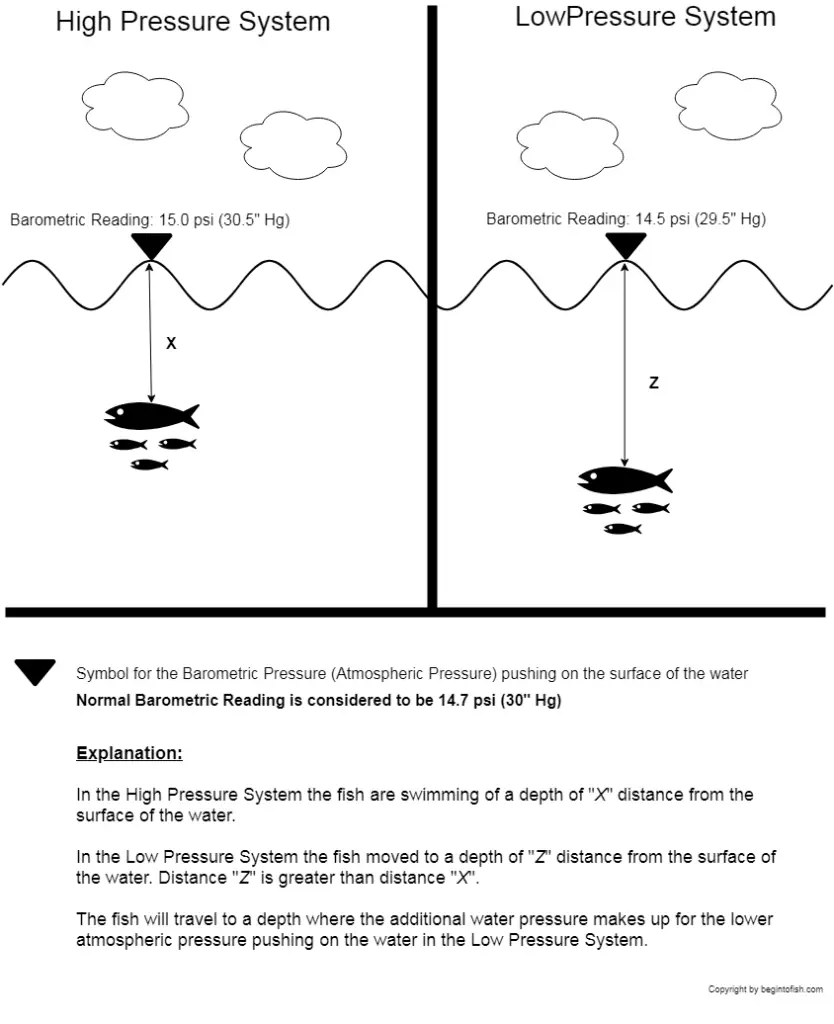
Experienced angler knows that the weather condition can affect how fish feeds. Tide, water temperature, wind, and the position of the sun or moon can play a part in how successful your fishing trip can be. How about when it rains? Is it really worth it to go out in the rain to try to get that monster fish?
Is it worth it to fish in the rain? Fishing in the rain is not worth it. Fish with swim bladders are affected by the change in atmospheric pressure associated with rainy conditions. These low-pressure systems can cause fish to be less active because of the discomfort it can cause. Therefore, the best time to fish is a day before the rain begins to fall. Fish will actively feed more to prepare themselves for the incoming low-pressure system.
To understand why the best time to fish is before bad weather arrives we need to better understand how the change atmospheric pressure affects fish.
What Is Barometric Pressure?
Barometric Pressure is used by meteorologist to describe atmospheric pressure. It is defined as the amount of pressure being exerted on the Earth’s surface by the atmosphere. Fluctuations in the barometric pressure provide signs of changing the weather. A rising pressure (high-pressure weather system) is usually an indication of good weather. A falling pressure (low-pressure weather system) is usually an indication of bad weather, like incoming rain.
How Does Barometric Pressure Affect Fish?

Changes in barometric pressure have been documented to cause joint pain and migraines in humans. So if changes in barometric pressure can affect humans then is it reasonable to believe that changes in the barometric pressure can impact fish.
A low-pressure system means that there is less pressure being applied to the surface of the water. Have less pressure pushing on the surface of the water results in fish feeling comfortable. This uncomfortable feeling is felt more by fish that has a swim bladder.
The purpose of the swim bladder is to control a fish’s depth by release or taking in air. As there is less pressure on the surface, then the fish are forced to swim deeper in an attempt to equalize their swim bladders which is unnatural for them. Thus this causes fish, especially with a swim bladder, to become less active.
These fish are aware that during a low-pressure system they will become less active. As a result, fish starts to actively feed in preparation for the low-pressure system because the fish don’t know if this will last for a few hours or days.
Fish that don’t have swim bladders will be impacted by a low-pressure system to a lesser degree than fish with fish bladders. Therefore, it is beneficial to understand a fish’s anatomy to know how the change in weather can affect certain fish.
Fishing Techniques During Barometric Pressure Changes
Knowing how barometric pressure changes can affect fish will give you an upper hand in understanding what fishing techniques should be used.
During A Falling Barometric Change
Remember that in the upcoming days before a low-pressure system arrives, fish will feed more actively than normal.
This is the best time to try different fishing strategies and different baits. Larger and fast moving baits would naturally appear to be more appealing to fish that are aggressively feeding. However, some fish would prefer large and slow-moving baits. Some fish would prefer smaller baits. This is the time to experiment with different methods.
During A Low Pressure System
During a low-pressure system fish with swim bladders would have already moved to deeper waters and have already fed. So the first day or two of the low-pressure system will be slow action. However, if the low-pressure system has been around for a few days then the fish would have to start looking for food again which could result in some action.
There is no need to be aggressive with your bait even if the fish are hungry they will not chase a fast moving or eat a large bait. Therefore, a smaller bait should be used such that a fish can easily get in a single bite. It could also be beneficial to slowly troll in the hopes that your bait will find its way closer to a hungry fish.
During A Rising Barometric Pressure
As the low-pressure system passes and the barometric pressure increases, the fish do not respond to this change right away. It typically takes one to three days for fish to return to their normal activities. Until then you can use the same fishing techniques and methods that you found to be working during the low-pressure system.
There are other factors that can reduce or extend the time it for fish to return to normal. Such factors would be the water temperature. The faster the water temperature rises the faster the fish will return to normal. When the water temperature takes longer to return to normal temperatures will cause the fish to readjust slowly.
During A Stable Barometric Pressure
After the aforementioned one to three day period, fish will essentially be back to their normal feeding patterns and are probably a bit hungrier than normal due to the reduce feeding during the low-pressure system. This would be a good window to head out to the water to capitalize on this window.
Fishing in Freshwater Lakes After It Rains
Freshwater fish tend to react to barometric pressure changes in a similar manner as saltwater fish. However, a major downpour will disturb the lake shoreline and surrounding areas cause the lake to collect muddy water as the rainwater runs into the lake. This can create the lake to become murky which creates poor “breathing” conditions for the fish. This is similar to how humans can’t breathing properly in air filled with smoke or smog.
The murky water will also make the water slightly thicker than normal which will increase the amount of energy a fish will need to use to just move around.
Thus it would be best to use small baits and use slow motions to move the bait. Considering that the fish are under extra stress an easy to bite presentation would be very adventitious.
Related Questions
Is fishing at night good?
Fishing can be good at any time of day but fishing at night can be very productive. Contributing factors such as less vessel traffic on the waters disturbing the fish, cooler waters, and the moon’s effect on the tides and currents can all cause favourable conditions for fishing.
Is It Better To Fish At Low Or High tide?
During a falling tide, it pushes baitfish further out into the sea for larger fish to feed. While a rising tide allows bait fish to come closer to the shoreline. This movement creates a lot of fish activities. To take advantage of the increased fish activities it is best to fish approximately 2 – 3 hours before low and high tides.
